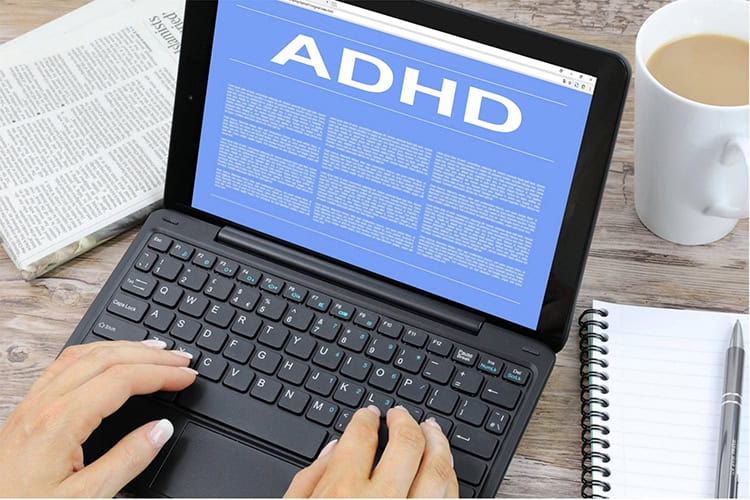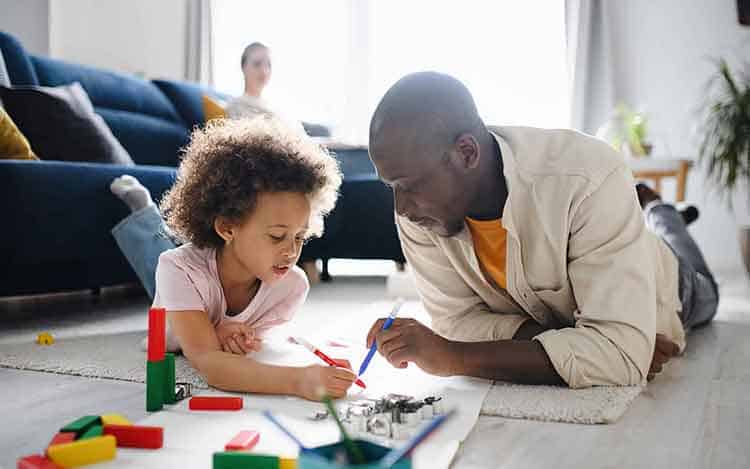As a parent of a child with Attention Deficit Hyperactivity Disorder (ADHD), tools and systems are essential to keeping your home and life organized. According to health professionals, such as those associated with the American Psychiatric Association, providing structured environments can greatly influence your kid’s behavior and overall mental health.
Many individuals only realize their struggles are due to the condition once they are ADHD diagnosed later in life. With these 8 ADHD organization hacks, you can set your child up for success by providing them with the resources they need to make their daily lives easier. From closet organization to helpful reminders and visual cues, we’ll go over how you can create an ADHD-friendly home and life.
Why Do People With ADHD Symptoms Struggle With Organization?

Children with Attention Deficit Hyperactivity Disorder (ADHD) typically deal with many developmental challenges, such as inattention, impulsivity, distractibility, emotional dysregulation, and issues with executive function skills. Mental health professionals highlight that these symptoms often make it difficult to stay organized, keep on top of recurring tasks, or be efficient. As a result, children with ADHD may struggle to keep their room clean, misplace essential items, or not partake in their chores, all of which are tied to deficits in executive function. Research on ‘Children ADHD and diagnosis’ continues to advance, offering better interventions and support systems.
Creating an ADHD-Friendly Home for Children with ADHD
To create an ADHD-friendly home for children with ADHD, follow these organizational hacks to help you establish specific ways to target your child’s ability to regulate attention, impulse control, and other ADHD symptoms. Children with ADHD often experience difficulties with working memory, self-control, and other executive function skills, making daily tasks challenging.
By incorporating strategies that address these mental disorders, you can create a more structured environment that supports a child’s symptoms. Understanding and addressing these issues head-on will assist not only in managing the symptoms but also in fostering a conducive space for growth and success for children with ADHD. ADHD can improve when kids get treatment, eat healthy food, get enough sleep and exercise, and have supportive parents who know how to respond to symptoms of ADHD.
Break Down Tasks Into Smaller Chunks
Asking your child with ADHD to complete large, abstract tasks like cleaning and organizing their room can quickly become overwhelming and overstimulating—where are they even supposed to start? Your child can build momentum as they work by breaking these down into smaller, more manageable tasks. For example, they can begin by simply clearing off their nightstand, and then go from there. This makes cleaning and organization a much less stressful process.
Children with ADHD and other disabilities such as Oppositional Defiant Disorder often require strategies that target executive function skills, which are crucial for task management. Health professionals emphasize the importance of individualized support under frameworks like the Disabilities Education Act, ensuring children with ADHD have the necessary accommodations to thrive.
Establish Routines and Manage The Child’s Behavior
Children with ADHD thrive in structured environments, crucial for their brain development and overall well-being. Consistent routines create a sense of predictability, helping your child know what and when to do it. Your child’s daily routine should include waking up, bedtime, meals, school, and play. However, you can also incorporate clean-up tasks to help avoid overwhelming messes and chaos.
For example, you can encourage your child to make their bed right after they get up or put their clothes in the hamper after they shower. These simple routines contribute to a more organized household and help your child regulate attention. Engaging in behavior therapy and fostering social skills from early childhood can also combat issues like low self-esteem, enabling children with ADHD to develop a more positive self-image and productive habits.
It isn’t that children with ADHD can’t pay attention: when they’re doing things they enjoy or hearing about topics in which they’re interested, they have no trouble focusing and staying on task. But when the task is repetitive or boring, they quickly tune out. Staying on track is another common problem.
Use Time to Your Advantage to Improve Executive Function Skills
One of the best Attention Deficit Hyperactivity Disorder (ADHD) organization hacks is carving out small chunks of time for cleaning, decluttering, and organizing. Many children with Kids ADHD and other learning disabilities benefit from structured time management. When it’s time to begin, set a timer for 10-30 minutes.
Have your kid focus on a single task, like cleaning their desk, which helps to tackle common symptoms such as inattention and distractibility. When the timer goes off, have them take a short break. Working in increments and incorporating scheduled breaks helps children focus on one task at a time, thereby enhancing their study skills and avoiding feeling overwhelmed.
Centralize Important Tasks
Many people with symptoms of ADHD are visual learners, so it’s helpful to see the tasks they need to complete. You can support your child by getting them a planner or putting a whiteboard on your fridge. Then, fill out important tasks and schedule items such as chores or homework. They can cross off their tasks and see their progress as they complete tasks.
This approach not only aids in organization but also helps combat poor self-esteem by allowing children to visualize their achievements, fostering a sense of accomplishment. While there is no cure for ADHD, employing strategies like these, along with guidance from your child’s doctor, can significantly improve daily functioning. It is also important to develop an Individualized Education Plan (IEP) for other children who need more tailored support within educational settings. By implementing such measures, you can adhere to disease control protocols and create an environment that supports mental and behavioral growth.
Set Clear Ground Rules and Expectations
Another great way to build an ADHD-friendly home is to establish clear ground rules and expectations. Tell your child you expect them to make their bed every morning. Alternatively, ask them to clear their plate after meals and load it in the dishwasher. Make sure you discuss these cleaning and organizational expectations with your child—unspoken, unmet expectations can lead to resentment, frustration, or overwhelming situations.
Family members should also be involved in these discussions to ensure everyone is on the same page. Children with ADHD can be easily distracted and are prone to making careless mistakes; thus, clear guidance is essential. Parent education on ADHD and associated challenges such as brain injuries can greatly benefit in setting realistic expectations and providing the necessary support. To encourage your kid to stay organized and stick to the routine, reward positive behavior. Rewards can be as simple as extra screen time or a sweet treat. Consulting a mental health professional can provide valuable insights and strategies tailored to your child’s needs.
Sometimes, clutter and disorganization result from your child being unable to start a task. Check out our blog to learn more about the relationship between ADHD and procrastination.

Attention Deficit Hyperactivity Disorder (ADHD) Home Organization Hacks
Now that we’ve covered some general ADHD organization hacks, let’s dive into the specifics. Here are a few key strategies to improve organization for children with ADHD symptoms on a day-to-day basis.
Make Items Visible and Accessible
Many people with ADHD struggle with their working memory. This makes it challenging to keep track of things and may cause your child to lose important items like their shoes or backpack. To combat this, try installing shelves or hooks, hanging up shoe organizers, or purchasing clear plastic bins. This gives everything a place to go and ensures that they’re visible and accessible even when put away.
Establish Designated Spaces for Items
On that note, another key ADHD organization hack is to designate certain spaces for important items. Try using trays or baskets for commonly misplaced items like keys, wallets, or phones. If your child is in the habit of putting things away in their designated spaces, they’ll always know where to find them. Can’t find your shoes? They’re in the organizer next to the back door, where they should be.
ADHD Closet Organization
Your child’s closet is filled with important things like their clothing and personal items. However, these spaces can quickly become dumping grounds for dirty laundry, trash, or toys that should have been put away properly. Here are a few ADHD organization hacks that can help your child keep their closet neat:
Sift through clothes: Every so often, take the time to go through your child’s wardrobe with them and get rid of anything too small, threadbare, or unworn. This reduces clutter within the closet and makes it easier to stay organized. You can hand these clothes down or donate them to charity.
Keep similar items together: When everything in the closet gets mixed, it can be overwhelming and difficult to deal with. Try putting hanging clothes, winter clothes, dirty laundry, and personal items in different areas of the closet.
Don’t pull everything out at once: Sometimes, you may be tempted to remove everything from the closet to organize it with a fresh start. This creates a mess throughout the rest of the room. Instead, work in sections, organizing one area of the closet at a time.
Find the Best Organizational Tools for ADHD With Mental Disorders Health Professionals at Abbey Neuropsychology Clinic
At Abbey Neuropsychology Clinic, we’re committed to helping your child navigate the challenges of ADHD in children by using medication-free treatment options. We understand the challenges of staying organized, so we strive to give your child the organizational tools they need to succeed in school and life. If your child is struggling to keep things in order and you seek professional help, schedule a free discovery call and see how we can help.






